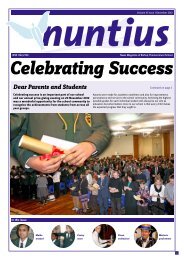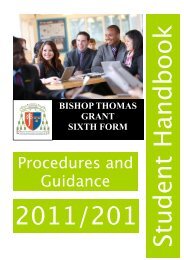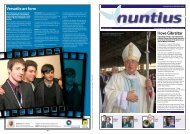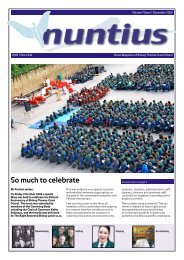From strength to strength - Bishop Thomas Grant School
From strength to strength - Bishop Thomas Grant School
From strength to strength - Bishop Thomas Grant School
Create successful ePaper yourself
Turn your PDF publications into a flip-book with our unique Google optimized e-Paper software.
A fascinating language<br />
Latin is now on the school curriculum,<br />
taught <strong>to</strong> a class in Year 7 by<br />
Ms Sini-Spencer, who was full of<br />
enthusiasm when she spoke <strong>to</strong> us:<br />
“We are following the Cambridge Latin<br />
Course, which is excellent. Students learn<br />
vocabulary and grammar through reading<br />
Latin narratives, not through memorising<br />
lists of words and reciting declensions.<br />
It is a fascinating language for anyone who<br />
likes people, ideas, words, the past or<br />
studying the way society works.<br />
Many English words are derived from<br />
Latin, so you can improve your knowledge<br />
of English – and learning Latin is<br />
invaluable if you are studying a<br />
Romance language.<br />
We will learn a lot about the Roman<br />
Empire, a key period in European his<strong>to</strong>ry.<br />
At the moment we are concentrating on<br />
Pompeii (pictured below), the <strong>to</strong>wn which<br />
was preserved for posterity after being<br />
buried by volcanic ash from<br />
Mount Vesuvius.<br />
A basic knowledge of Latin is useful on<br />
many degree courses, <strong>to</strong>o. Think of all<br />
those names in Biology.<br />
Because I am Greek, I have an extra<br />
interest in Latin. I know, for example, that<br />
triclinium is the word for a formal dining<br />
room. It comes from the Greek triklinion<br />
( which means ‘three couches’.<br />
Each couch was big enough for three<br />
diners, who would eat food brought <strong>to</strong><br />
them by slaves while reclining on their left<br />
sides. The word recline comes from the<br />
Latin reclinare – which means ‘<strong>to</strong><br />
lean back’.<br />
The subject has been introduced and is<br />
catching on, so hopefully it will expand<br />
in future.”<br />
Samuel Abara (in the picture) commented:<br />
“Through Latin we can learn about ancient<br />
times. It is easy sometimes, because of<br />
its connections with English, and our<br />
teacher explains things so that we all<br />
understand.”<br />
Headteacher: Mr L Desa BSc<br />
<strong>Bishop</strong> <strong>Thomas</strong> <strong>Grant</strong> <strong>School</strong>,<br />
Belltrees Grove, London, SW16 2HY<br />
Telephone 020 8769 3294 Fax 020 8769 4917<br />
website: www.btg.ac<br />
Email: headteacher@btg-secondary.lambeth.sch.uk<br />
The six most widely-spoken<br />
standardised languages which<br />
descend from Latin – the Romance<br />
languages – are Spanish (about 329<br />
million), Portuguese (178 million),<br />
French (68 million), Italian (62 million),<br />
Romanian (23 million) and Catalan<br />
(12 million), the numbers being for<br />
native speakers. Two thirds of all<br />
Romance speakers live<br />
outside Europe.<br />
Edited and produced by Richard Wilcocks. Enquiries <strong>to</strong> Meerkat Publications and Design 0845 9011 809<br />
—12—













